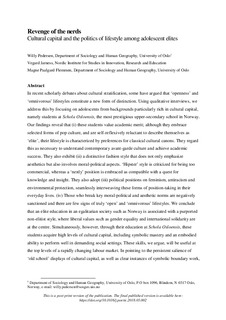| dc.description.abstract | In recent scholarly debates about cultural stratification, some have argued that ‘openness’ and ‘omnivorous’ lifestyles constitute a new form of distinction. Using qualitative interviews, we address this by focusing on adolescents from backgrounds particularly rich in cultural capital, namely students at Schola Osloensis, the most prestigious upper-secondary school in Norway. Our findings reveal that (i) these students value academic merit; although they embrace selected forms of pop culture, and are self-reflexively reluctant to describe themselves as ‘elite’, their lifestyle is characterized by preferences for classical cultural canons. They regard this as necessary to understand contemporary avant-garde culture and achieve academic success. They also exhibit (ii) a distinctive fashion style that does not only emphasize aesthetics but also involves moral-political aspects. ‘Hipster’ style is criticized for being too commercial, whereas a ‘nerdy’ position is embraced as compatible with a quest for knowledge and insight. They also adopt (iii) political positions on feminism, antiracism and environmental protection, seamlessly interweaving these forms of position-taking in their everyday lives. (iv) Those who break key moral-political and aesthetic norms are negatively sanctioned and there are few signs of truly ‘open’ and ‘omnivorous’ lifestyles. We conclude that an elite education in an egalitarian society such as Norway is associated with a purported non-elitist style, where liberal values such as gender equality and international solidarity are at the centre. Simultaneously, however, through their education at Schola Osloensis, these students acquire high levels of cultural capital, including symbolic mastery and an embodied ability to perform well in demanding social settings. These skills, we argue, will be useful at the top levels of a rapidly changing labour market. In pointing to the persistent salience of ‘old school’ displays of cultural capital, as well as clear instances of symbolic boundary work, our study challenges core assumptions in research about cultural stratification and omnivorousness. | nb_NO |
